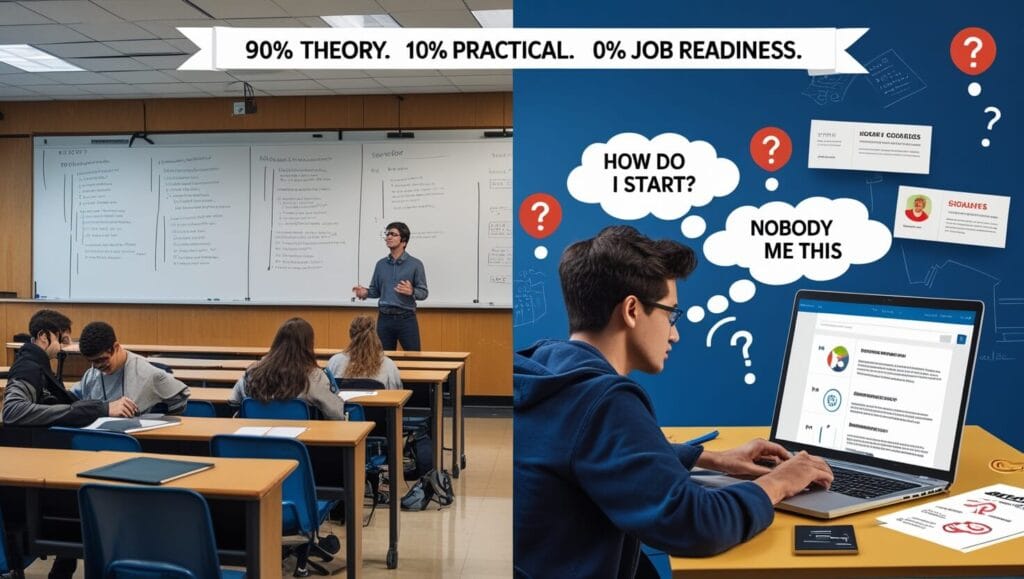The truth behind 100% placements, fake promises, and the Skills vs Degree confusion

100% Placements – This Sentence Gets Millions Into College Traps
Colleges Are Fooling Students : “100% placement guarantee” – this statement appears on every college advertisement, banner, and pamphlet these days. Sounds like a dream especially if you’re a 12th pass, and/or looking to build a career in a hurry. But let’s face it people, 100% placement doesn’t exist for some/anyone.
Yes, colleges have placement records of the past. They’ll tell you the statistics instead: “in 2022, 95% of students were placed.” – but they won’t tell you:
- How many got placed in core jobs?
- How many were placed in jobs under ₹10,000 salary?
- How many got jobs outside their field?
Some even count internships or unpaid jobs as “placements”.
So basically,Colleges Are Fooling Students with stats that don’t show the complete truth.
Where Are The Skills?

Another issue: the majority of colleges still offer 90% theory, and 10% practical information.
You go to lectures, you hand in assignments, and you write exams – but the reality of actually doing the work leaves you wondering how? Why? Because:
- No one taught you how to communicate in interviews
- You didn’t work on real projects
- You didn’t learn how to use trending tools and software
Colleges claim that they offer “industry-level training”, but more students leave without ever knowing even how to build a simple website, write a real resume, or face an HR round.
Or even worse, they teach you how to pass an exam, not how to solve problems in real life. This is one more way Colleges Are Fooling Students that is the biggest divide between education and employment.
Education vs Employment : What Really Matters?

| Aspect | Education | Employment |
|---|---|---|
| Primary Focus | Theoretical knowledge, structured learning | Practical experience, real-world problem solving |
| Advantage | Builds a strong knowledge foundation | Develops applicable job skills |
| Limitation | Often lacks industry application | May lack depth without educational backing |
| Industry Preference | Needed for roles with certifications (doctor, lawyer) | Preferred in fast-paced industries (tech, media) |
| Growth Path | Slower start, strong for long-term careers | Fast learning, immediate feedback |
| Best Strategy | Combine with internships, projects | Pair with certifications, continuous learning |
The intelligent option is to use education for the understanding of theory, and employment or internship for the practical application.
Skills vs Degree – What Matters in 2025?

As a student today, you’re wondering this question on a daily basis: Does a degree really matter more than skills?The honest answer is: Both are important, but the skills will always help you go further.
The companies are asking:
- What can you do?
- What projects have you worked on?
- Can you solve real problems?
Colleges Are Fooling Students — by selling degrees not skills.No one is impressed by just your marksheet anymore.
A degree might get you an interview, but skills get you the job.
Internship Drama – Real vs. Fake?

Some colleges have “internship” policies that essentially hand out certificates for “time spent.” They don’t send students to real companies, they fake a report and the college signs it and all they can call it is an internship.
Now students never learned anything valuable, but the college uses that to put down on their placement record, to the college students are winning and thats how Colleges Are Fooling Students.
What to Consider Before Choosing a College ?
- Know Your Career Goal & Interest – Choose a college based on the course that fits your dreams.
- Check Curriculum – Look for a practical, skill-based syllabus.
- Faculty – Are they experienced? Do they teach real-world knowledge?
- Placements – Ask for real data, not 100% placments report.
- Internships – Does the college offer real industry exposure?
- Fees vs ROI – Is the education worth the money you spend?
- Location – Proximity to job markets matters.
- Reviews & Alumni – Talk to current or past students.
- Accreditation – Make sure the college is recognized by UGC/AICTE.

Conclusion
Colleges are businesses at this point in time. Colleges are there to sell admissions, not develop careers. So it is up to you to pay attention, to ask questions, and develop skills along with your degree.
It's important to remember: a college can give you a piece of paper declaring you a graduate, but only you can build your tomorrow.
No. The “100% placement” claim is often a marketing gimmick. Many colleges include low-paying, irrelevant, or even unpaid jobs in their statistics. Always verify the quality and relevance of placements.
Ask for detailed placement reports.
Speak to recent alumni or current students.
Check LinkedIn profiles of past students to see where they actually work.
Don’t trust only the brochure or website.
No. Degrees are still important for many roles, especially in medicine, law, and government. Skills are much more relevant in some industries, including tech, media, marketing, design, and entrepreneurial areas.
Ideally, do both together. Use college for structured learning and build skills outside class through projects, freelancing, internships, and online courses.
Because many colleges focus on theory over practical skills, lack real-world exposure, and do not train students in soft skills like communication, problem-solving, and interviews.
Many colleges offer fake or low-value internships just to fill the formality. Check if the internship involves real projects, feedback, mentorship, and skill-building.
Very important. Colleges near tech hubs or industrial areas often have better industry connections and job opportunities.
Absolutely. Many successful professionals come from average colleges. What matters is what you learn, build, and apply, not just the college name.
Also Read – AI in education










Leave a Reply